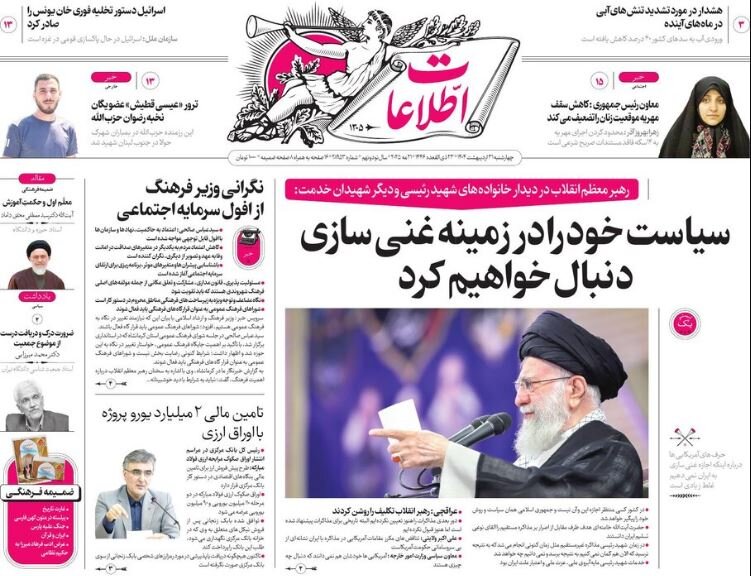Iran-US talks face challenges

TEHRAN - In an interview with Abdolreza Faraji Rad, a professor of geopolitics, Ettelaat examined the recent tense positions of Iran and the United States after some rounds of indirect negotiations.
He said: Four rounds of negotiations were full of ups and downs. It was decided that Iran and the United States would enter into technical negotiations in the fifth round, and this was officially announced. But again, we heard contradictory statements from the Americans, saying that Iran would not be allowed to enrich uranium. Now the United States must clarify its position. That is, Iran has announced at the highest level that we are not ready to reduce enrichment to zero. Now the fifth round becomes sensitive; either the U.S. will start technical negotiations based on what they said in the fourth round, or the negotiations will be interrupted, and the mediators, Oman or other countries, will find a solution to resume the negotiations.
Siasat-e-Rooz: Completely unreasonable and illogical
Siasat-e-Rooz dedicated its headline to the U.S. excessive demands from talks with Iran and the Revolutionary Leader’s response to these demands. It wrote: The reality is that the West’s, especially the U.S., emphasis on a complete stop to nuclear enrichment in Iran is not simply due to nuclear concerns, but is part of the long-term strategy to contain the Islamic Republic of Iran’s national power. For this reason, the Leader’s decisive response to this issue is considered to be more than a diplomatic stance. In a situation where the United States is trying to weaken Iran's regional position by creating false bipolarity after Trump visits the region, the Leader's quick and clear warning of this process is considered a kind of strategic move to right the path of negotiations and a warning to the decision-making structure in the country. This warning carries several important messages: first, the Islamic Republic of Iran will never be pressured to back down from its nuclear rights. Second, the negotiating team must be vigilant against deceptive messages and plans that appear to be "neutral" but are misguided by the United States. Third, continuing negotiations is legitimate only if “dignity, wisdom, and the expediency” of the Islamic Republic’s system are taken into account.
Iran: Tehran-Muscat-Doha triangle at the talks table
In a note, the Iran newspaper discussed the importance of the Tehran Dialogue Forum and wrote: Tehran once again became the host of one of the most important regional and international dialogue forums in recent days. This forum was not only a platform for exchanging views on the future of the region but also an opportunity for sensitive diplomatic consultations, including indirect negotiations between Iran and the United States. But what made this forum more than a typical diplomatic meeting was the presence of key figures from neighboring countries and important regional players. Perhaps the most important development in this meeting was the trilateral consultation between Iran, Oman, and Qatar. According to Araghchi, they support the talks and are trying to help the talks. Iran's clear stance that "our positions are clear and we will continue enrichment" shows that Iran, while ready for talks, has not abandoned its principles and red lines and continues to stand up openly against political pressures. In a changing regional environment, meetings such as the Tehran Forum and trilateral consultations are on the one side, and windows for active diplomacy, on the other, highlighting that the Islamic Republic of Iran follows a stable foreign policy.
Arman-e-Emrooz: The necessities of negotiation composition
If the negotiation process continues based on the frameworks and considerations of the Islamic Republic, the involvement of the private cooperative sector will help advance the negotiations. The reality is that economic interests carry more weight and importance for the parties in the current situation, and the composition of the other side's representatives also reflects this issue. Unfortunately, this issue was given less attention in the process of ratifying the JCPOA, and therefore, from the point of view of economic actors, the JCPOA did not facilitate economic activities in international trade desirably. Raising issues such as the other side's interests in investing in the country and the need to meaningfully remove oppressive sanctions doubles the importance of this issue. It should be noted that the international system has tried to create disruptions in interactions of Iran’s economic actors by imposing sanctions in recent years. Of course, economic actors have always tried to neutralize them with great effort, but they must be given more room to play their role.
